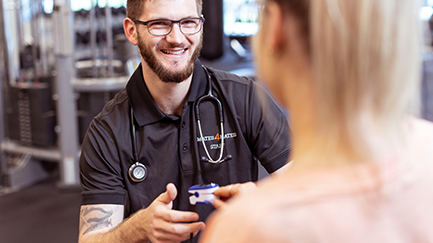Women’s Health Week, held annually in September, aims to improve women’s health, empowering women and girls across Australia to make choices that are right for them and their health.
Women’s Health Week 2024 focuses on ‘Your Voice, Your Choice’, encouraging women to advocate for their own health.
What does it mean to advocate for your health?
Advocating for your health means being the expert of your own body. Doctors and specialists may be the professional experts in their field, but you know your own body best. If something doesn’t feel right, or doesn’t fit with your body or your lifestyle, it is important to speak up.
Each year in Australia, about 140,000 diagnostic errors occur. Unfortunately, these misdiagnoses can disproportionately affect women due to limited focus on women-specific health issues, communication styles, and gender bias.
Medical professionals are reliant on the information you provide about your medical conditions to provide you with their highest level of support. If you feel your medical professional doesn’t understand your concerns, it is important to discuss this with them, and if necessary, it is your right to seek an alternative health professional you may feel more comfortable with or who specialises in your area of need.
A health professional is a partner in your health journey, and it is important that you can trust your health professional to advocate for what is best for you. As professionals, their advice is vital, but it is important to ask questions so you can better understand yourself and your body, and if required, seek additional advice to make informed decisions when it comes to your health.
Advocating for your mental health
Feeling heard and validated that your health concern is being taken seriously can be very reassuring. Feeling dismissed or that your concerns are being minimised can impact a person’s mental health, their ability to access appropriate, quality, and safe healthcare, and can ultimately affect their health outcomes.
Negative healthcare experiences surrounding women’s pain or concerns can leave women feeling unsupported and impact their self-esteem, which is why it is important to advocate for your physical and mental health and build positive relationships with your health professionals.
Common women’s health concerns
Health concerns that are more likely to be misdiagnosed in women include:
- Heart disease: women often don’t have textbook presentation of heart disease, so it is important to be aware of signs of heart related symptoms for women. There can be greater risk for people who have a family history of heart issues, high blood pressure, diabetes, high cholesterol, obesity, inactivity, an autoimmune disease, smoking, a history of pregnancy complications, early menopause, depression, some cancer treatments and polycystic ovary syndrome.
- Autoimmune diseases: many different parts of the body can be affected by autoimmune diseases and there are many different conditions (e.g., coeliac disease, rheumatoid arthritis, thyroid diseases and multiple sclerosis). It can sometimes be difficult to figure out what is happening when you have symptoms of these conditions, so it is important to find a doctor or team who are willing to continue testing, look for patterns, and collaborate with health professionals.
- Endometriosis and polycystic ovary syndrome: If pain and discomfort get in the way of your life or if you know or feel that your level of pain is not normal, talk with your doctor for further tests or advice. If you receive some form of treatment and it isn't working, go back to your doctor. You may wish to see someone who specialises in women’s health concerns. It may help to take a support person who can provide corroborating information that the level of pain or discomfort you are experiencing is not normal and it is having a significant impact on your life.
- Sleep apnea: sleep apnea can present differently in women, with less obvious symptoms such as fatigue, depression and insomnia, which may be attributed to other conditions or lifestyle. The different presentation can lead to underdiagnosis and undertreatment.
- ADHD: ADHD can be missed in girls as they are more likely to have the ‘inattentive type’, which can present as less disruptive than the ‘hyperactive type’. Unfortunately, this can lead to undiagnosed ADHD that presents in early adulthood as anxiety or depression, where the person can feel like they are failing at life, rather than understanding that their brains operate a little differently.
- Autism spectrum disorder (ASD): similarly, ASD can present differently in girls. Girls are often better at masking their symptoms and mimicking their peers, which camouflages some of the characteristic features of ASD, including difficulties with social interactions. Undiagnosed ASD may also later be picked up in adulthood when a person is receiving treatment for anxiety or depression.
Working with your doctor as a veteran
Navigating the differences in the health systems in Defence compared with the civilian world can present unique challenges for a veteran in advocating for their health needs.
Veterans may have become accustomed to a culture of discipline and respect for hierarchy, which might make it difficult to advocate for themselves with doctors, or to seek a second opinion. Where doctors work in collaboration with their patients, there are better health outcomes.
It is important to know you can speak up around your health concerns, ask questions and disagree, or seek another opinion to get the best outcome for your own health.
Support at Mates4Mates
Mates4Mates offers veterans and Defence family members access to a range of mental and physical health clinicians who aim to help you succeed with your health goals. Clinicians can support you in building self-esteem, problem solving, and learning more about exercises that may benefit your health.
Mates4Mates psychologists, social workers, counsellors, exercise physiologists and physiotherapists are available for appointments in centre or via telehealth.
Mates4Mates is a community of veterans and Defence families, and as such we run social connection activities, providing opportunities to connect with others who may have shared experiences and provide new perspectives that can help with your health journey.
For more information about Mates4Mates services and how we can help to support you, reach out to us on 1300 4 MATES (62 837) for a confidential chat.
Written by Hannah Jarrold, Mates4Mates Psychologist





